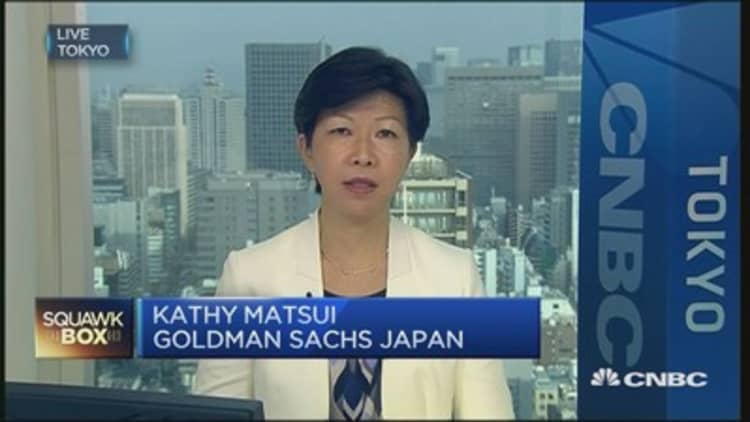
The Bank of Japan is in no hurry to introduce new monetary easing measures as the country's outlook improves, said Goldman Sach's chief Japan strategist Monday.
"(The BOJ) may do more but the timing is quite tricky," said Managing Director and Chief Japan Strategist, Kathy Matsui.
Japan's economy dodged a technical recession in the third quarter, rising at a 1 percent annualized rate, compared with a preliminary reading of a 0.8 percent contraction.
In addition to the upward revision of third quarter GDP, Monday's Tankan survey showed business sentiment holding steady in the three months to December while core machinery orders also rose unexpectedly last week.
As the economy is "gradually heading out of deflation and you're actually seeing some decent signs of growth," the BOJ is likely to hold out on easing until April rather than late-January as the bank earlier forecasted, Matsui said.
"With pretty limited bullets to spare on the part of BOJ do they really want to spend those bullets now? We think the answer is probably not," she said.
Matsui said Goldman Sachs is expecting the Federal Reserve to raise interest rates by a cumulative 100 basis points, beginning this week's meeting.
A basis point is 1/100th of a percentage point.
Given its forecast for the Fed and expectations of further easing from the BOJ, Matsui said Goldman is "very dollar bullish" and is forecasting the USD/JPY to average 125 next year from 120 this year.
The USD/JPY is currently near 121, rising more than 10 percent after the BOJ introduced easing measures in October last year.
Despite its call on a weaker yen, corporate Japan is unlikely to be impacted much as surveys have shown that the sensitivity of profits to the USD/JPY has nearly halved from comparable levels a few years ago, she added.
"You need to be very careful about over-estimating the impact of dollar-yen particularly because earnings have already doubled since their 2012 lows," Matsui added


